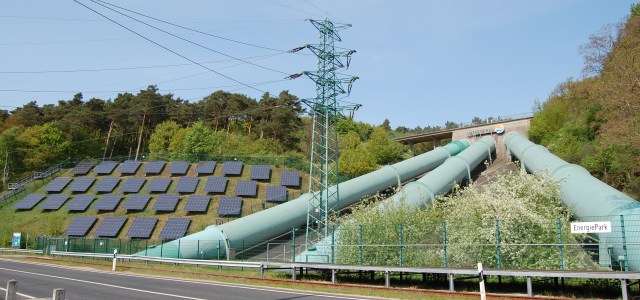A recent study commissioned by Agora Energiewende comes to the conclusion that the German Energiewende does not need new electricity storage within the next 20 years. Instead, flexible fossil-fueled power plants and other intermediate options can deliver the needed power and grid stability at a lower price. Matthias Lang sums up the finding of the report.

Power storages will become necessary in the future – but for now, there are cheaper options available. (Photo by IqRS, CC BY-SA 3.0)
Up to a share of 60% of renewable energy sources in the energy mix, i.e. for the next 15 to 20 years, the German energy transformation can do without new electricity storage facilities, as there are cheaper options to provide the flexible electricity input needed in view of the intermittent nature of renewables. However, new storage technologies like batteries, power-to-heat or power-to-gas will presumably grow dynamically nonetheless, due to rising demand from the transport, heat and chemicals, a new study presented by the energy think tank, Agora Energiewende, says.
For the time being, back-up power for renewables can be provided at lower cost by flexible input from fossil-fueled power plants, load-management and power trading with neighboring countries, the study commissioned by Agora Energiewende claims. Yet the electricity system will benefit from the growth of storage technologies in other sectors, e.g. batteries in electric cars, the authors say.
Besides, Patrick Graichen, Director of Agora Energiewende, pointed out that while electricity storage was still comparatively expensive, this could change quickly. Therefore he demanded that electricity storage get equal access to the markets, i.e. the markets for flexible energy input like the market for operating reserve and (in the future) a possible capacity market (that remunerates operators for providing flexible capacity) as well as to the distribution grids.
The study that was conducted by four university research institutes distinguishes between long-term and short-term storage and models electricity storage growth in three different scenarios that depict the projected electricity systems in 2023 respectively 2030 and an electricity system with a 90% share of renewables. The study also looked into the use of electricity storage options for system services besides analysing the possibilities for balancing electricity generation and demand. In doing so, the study also analysed the electricity distribution system, finding certain applications for battery storage that are already cost-efficient today. However, the authors believe that they will only reach a limited market share.
Agora Energiewende is sponsored by Mercator Foundation, a private foundation, and the European Climate Foundation. Its first director was Rainer Baake, a long-time Green party member and state secretary in the Federal Environment Ministry from 1998 to 2005. Since January 2014 Mr Baake is state secretary in the Federal Ministry for Economic Affairs and Energy under Minister Sigmar Gabriel. He has been involved in the latest revision of the EEG, which the federal government recently adopted.
Source: Agora Energiewende
This post first appeared on German Energy Blog and is reposted with the kind permission of its author Matthias Lang.